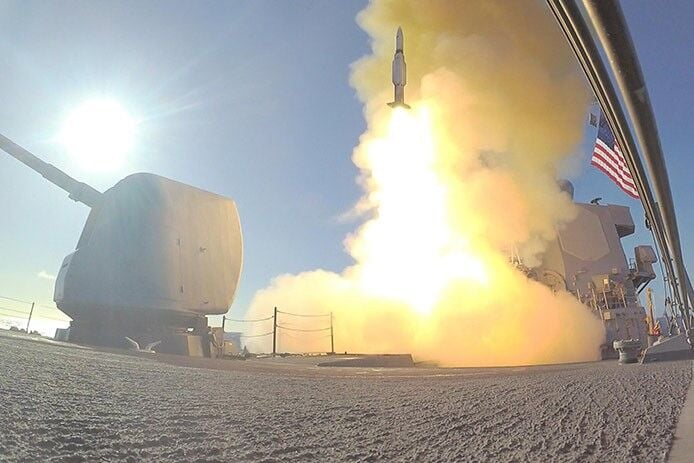Tucson-based Raytheon Missiles & Defense has won a contract worth up to nearly $600 million through 2026 to produce hundreds of ship-defense missiles for the U.S. Navy and seven allied nations.
The Navy awarded a $578 million contract to produce 54 Standard Missile-2 Block IIIAZ upgraded rounds for the Navy, and 215 complete Standard Missile-2 variants for Chile, Denmark, Japan, South Korea, Netherlands, Spain and Taiwan.
The Navy has obligated about $37 million in fiscal 2021 funds under the contract. South Korea is the top foreign buyer with $232 million committed, followed by Denmark ($98 million) and Taiwan ($58 million).
With options, the contract could be worth up to $586 million, and 45% of the work is expected to be performed in Tucson, according to a Pentagon contract notice.
Raytheon — Tucson’s largest private employer with about 13,000 local employees — restarted its SM-2 production line last year after multiple allied countries pooled resources to make a “bundle” purchase.
The company says it reconfigured and modernized its SM-2 missile factory to increase production efficiencies, and signed new agreements with several suppliers.
In service since 1979, the SM-2 is designed to defend against anti-ship missiles and aircraft up to a range of about 100 miles and has been continually upgraded with new missile technologies.
The contract includes the latest SM-2 Block IIIA and IIIB variants, which include advanced radar target seekers, controls and propulsion to engage high-speed maneuvering threats and advanced warheads. The Block IIIB also includes autonomous infrared, or heat-seeking, targeting capabilities.
In a test flight last year, the first Block IIIB missile from the restarted production line tracked and hit an airborne Navy target, Raytheon said.
“SM-2 continues to be a premier ship air-defense weapon for many partner navies worldwide,” said Kim Ernzen, vice president of naval power at Raytheon Missiles & Defense. “Here at home, the SM-2 will protect U.S. Navy ships and crews through 2035 and beyond.”





